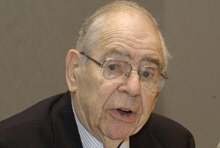
Typical street scene in Santa Ana, El Salvador. (Photo: iStock)
IMF Survey: Jacques Polak, Iconic Economist at the IMF, Dies at 95
March 1, 2010
Jacques Polak, who was present at the creation of the International Monetary Fund in 1944 and provided the intellectual foundation for its basic economic approach, died February 26. He was 95.

Jacques Polak, early visionary at the IMF, has died at the age of 95 (photo: IMF)
BRETTON WOODS – END OF AN ERA
Dr. Polak, a native of the Netherlands, was a member of his nation’s delegation to the Bretton Woods Conference in New Hampshire where the idea of both the IMF and the World Bank was hatched. He was thought to be one of the last surviving participants in the conference.
“It is with great sadness that I have learned of the passing of Jacques Polak, an iconic figure in the long history of the International Monetary Fund. Jacques’s distinguished career as an economist—a career that spanned seven decades—established him as a leader of critical thought during the post-war evolution of the global economy,” IMF Managing Director Dominique Strauss-Kahn said in a statement.
As a 32-year-old wunderkind who already had developed an important model of the world economy, Dr. Polak signed on to the fledgling IMF in 1947 as member of its Research Department. He became Research Director in 1958 and added the position of Economic Counsellor in 1966. He retired formally in 1979, but served the Fund in a variety of roles almost until his death.
During the three decades he was a senior IMF official, Dr. Polak played a major role in the development of the international monetary system: its creation in the years immediately following World War II and its recalibration in the early 1970s after the demise of the global fixed exchange rate system. He was instrumental in the development of Special Drawing Rights (SDRs)—the international reserve asset that was utilized as recently as last year to bolster international liquidity during the global financial crisis.
But it was his development of the eponymous Polak Model in 1957 that both Dr. Polak and colleagues agree was the economist’s most important contribution both to economics and to the institution he served for six decades.
The Polak Model explained a country’s balance of payments in monetary terms, enabling economists to understand the causes of a country’s international economic imbalances. By locating the source of balance of payments problems in domestic credit creation, the model gave the IMF the ability to prescribe the steps a nation in economic distress should take to correct them.
“There must be literally hundreds of papers that take off from the Polak Model and hundreds of Fund programs that utilized it,” Mohsin Khan, a former IMF official and colleague of Dr. Polak’s, said in an interview in 2008. “The genius of the model is that it straddles “both theory and operational work.”
Dr. Polak left the Fund’s employ in early 1980, staying on for several months past his formal retirement during a U.S. dollar crisis to advise then-Managing Director Jacques de Larosière about a proposal to create a special IMF account to enhance the role of the SDR. The so-called substitution account would have allowed countries to exchange unwanted dollars for SDRs. But when the dollar suddenly strengthened, countries lost interest in the proposal and “an opportunity for radical change in the system was missed,” Dr. Polak said in an interview in 2008.
Dr. Polak, who started studies in accounting but shifted to economics during the Depression, studied under Jan Tinbergen, the noted Dutch economist who was to share the first Nobel laureate in economics in 1969. He followed Tinbergen to the League of Nations in Geneva, Switzerland, in 1937 to work first on global economic studies, then, even as war was raging, on plans for the peace––to avoid the mistakes made at the end of World War I.
He and colleagues survived what he called a “harrowing trip” from Geneva across occupied France, Spain and Portugal to the United States in 1940 to continue the planning work at the Institute for Advanced Study at Princeton University. He subsequently went to work for the Dutch Embassy in Washington, D.C., where he participated in the planning sessions that preceded the Bretton Woods conference, which he attended in July 1944 as a member of the Dutch delegation.
In 1946, “pretty badly in need of a job,” as he put it in the 2008 interview, he accepted an offer from Edward M. Bernstein, the IMF’s first director of research, and began a six-decade affiliation with the fund. In 1981, a year after retiring from the Fund staff, he became Executive Director for the Netherlands and learned, he said, that a small country can “play an important role as part of the conscience of the Board.”
He also served as president of the IMF’s Per Jacobsson Foundation from 1987 to 1997 and after that maintained an advisory role, coming to the IMF several times a week until late 2007.
The IMF named its annual research conference after Dr. Polak. “This conference will remain a testimony to his service to the IMF and the global monetary system,” Strauss-Kahn said.
Dr. Polak’s wife Josephine, died in 2008. He is survived by a son, Willem, and a sister, Martha Ben-Assa.


